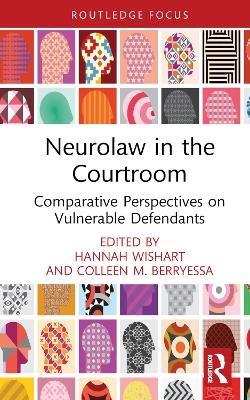
Neurolaw in the Courtroom
Routledge (Verlag)
978-1-032-36267-0 (ISBN)
This collection presents a comparative perspective on interdisciplinary issues that fall under the emerging field of Neurolaw. The chapters embrace distinct procedural and evidential issues in the courtroom for vulnerable defendants, such as immature defendants, mentally disordered offenders and unfit-to-plead defendants, through a neuroscientific lens. This view is informed by worldwide analyses from legal academics, philosophers, and legal practitioners. The work brings together interdisciplinary and leading perspectives to discuss the use and relevancy of neuroscience at trial, and how the use of neuroscience is currently benefiting and impacting vulnerable defendants in global criminal trials. As such, the book builds upon and adds to the existing literature in this field by providing a comprehensive coverage of the intersection between these disciplines for vulnerable defendants in the courtroom. Key issues covered include: vulnerable defendants and the pre-trial process; the trial process; the use of neuroscience as expert evidence at trial; and vulnerable defendants, neuroscience and mitigation of sentence. Through original exploration presented by contributors from both academia and practice, the book will be of interest to academics, researchers and policy-makers working in the areas of Criminal Law and Procedure.
Hannah Wishart is a Lecturer in Law at the University of Sunderland and a PhD Candidate at the School of Law, University of Manchester. Colleen M. Berryessa is an Assistant Professor at the Rutgers University School of Criminal Justice.
Introduction; 1. Vulnerable defendants and neuroscience in courtrooms worldwide; 2. Offering neurotechnology to defendants: On vulnerability, voluntariness, and consent; 3. Vulnerable defendants: Redefining decision-making through the lenses of neuroscience, law and artificial intelligence; 4. Safeguarding the procedural rights of young defendants in England and Wales: The role of neuroscience; 5. Criminal insanity in Norwegian law between care and societal protection; 6. Social vulnerability on trial: The role of the neuroscience of trauma in recognising severe social adversity in sentencing
| Erscheinungsdatum | 20.10.2023 |
|---|---|
| Reihe/Serie | Routledge Contemporary Issues in Criminal Justice and Procedure |
| Zusatzinfo | 3 Tables, black and white |
| Verlagsort | London |
| Sprache | englisch |
| Maße | 138 x 216 mm |
| Gewicht | 258 g |
| Themenwelt | Recht / Steuern ► EU / Internationales Recht |
| Recht / Steuern ► Strafrecht ► Kriminologie | |
| Recht / Steuern ► Strafrecht ► Strafverfahrensrecht | |
| Sozialwissenschaften ► Soziologie | |
| ISBN-10 | 1-032-36267-7 / 1032362677 |
| ISBN-13 | 978-1-032-36267-0 / 9781032362670 |
| Zustand | Neuware |
| Haben Sie eine Frage zum Produkt? |
aus dem Bereich


